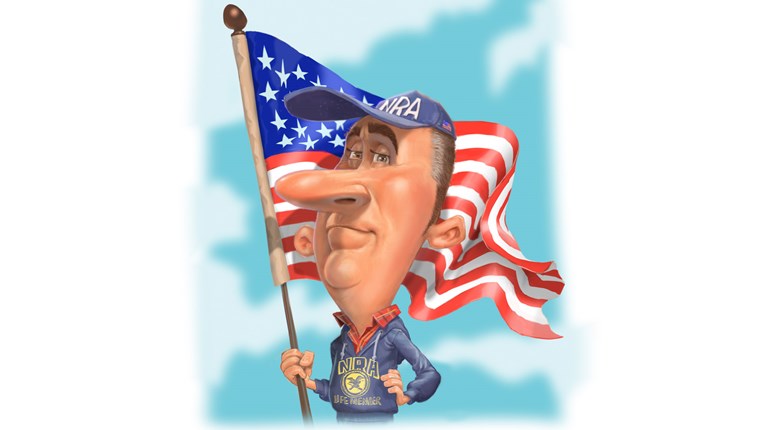
The NRA’s opponents can’t seem to decide whether they should still claim the organization “skews the gun debate” by “wielding disproportionate political influence” or instead claim that we’re now in our “death throes.”
Here’s the truth. The NRA continues to do what it has always done: shrewdly deploying our resources and activating our highly engaged and motivated membership to protect the Second Amendment.
If there’s any doubt about this, our victory in blocking the appointment of David Chipman—Joe Biden’s toxic nominee to lead the Bureau of Alcohol, Tobacco, Firearms and Explosives (ATF)—should conclusively resolve it.
Chipman’s appointment would have been a disaster for law-abiding gun owners and the lawful industries that serve them. How it was stopped demonstrates that NRA members are still the most potent political force in America.
It also shows the contrast between the NRA, the strength of which is in its grassroots support and membership, and the institutional anti-gun lobby, which derives its lifeblood from a handful of immensely wealthy patrons whose elitist worldview drives the cause.
Indeed, Chipman’s nomination was the product of a highly funded advocacy effort by anti-gun groups seeking to install one of their own operatives at the top of the government agency responsible for administering federal gun control.
It’s no secret New York billionaire Michael Bloomberg spent heavily to support candidate Biden in the 2020 presidential election, purportedly shelling out $100 million in Florida alone.
Meanwhile, it’s equally well known that Bloomberg’s hobbies include not just bankrolling political candidates but almost single-handedly propping up the anti-gun lobby in the United States through his Everytown umbrella of AstroTurf advocacy groups.
Chipman worked on the Everytown payroll as a “policy advisor.” Later, he switched to working for Giffords, another gun-control group whose DNA goes back to a group of anti-gun lawyers in San Francisco and whose West Coast support comes from tech barons, venture capitalists and Hollywood producers, among others.
Chipman’s experience working at ATF was supposed to lend weight and credibility to his credentials both as a policy advisor to anti-gun groups and as a nominee for ATF director.
Yet the true impetus behind his nomination was his connection to the firearm-prohibition lobby, and, by extension, to Biden campaign mega-donors like Bloomberg.
Concerns that Chipman’s anti-gun advocacy work would taint his professionalism as ATF director were confirmed at his disastrous confirmation hearing. His answers to straightforward questions were by turns evasive and alarming. For example, he at first claimed to be unable to define the sorts of “assault weapons” he wanted to see banned by Congress. When pressed, however, he said the term could include ANY semi-automatic rifle with a caliber larger than .22 that uses a detachable magazine.
Blocking Chipman’s confirmation therefore became one of the NRA’s highest priorities.
The first step was educating our members, policymakers and the public on who Chipman really is and what he really supports in the area of gun policy. Magazine and website articles, email alerts and social-media posts all exposed Chipman’s record of anti-gun positions and activism, as well as his sneering attitude toward ordinary gun owners.
The NRA then organized, hosted and staffed 26 townhall meetings for members in key battleground states to educate and equip them to engage with their senators in opposition to Chipman’s confirmation.
We also ran television ads in Maine, Montana and West Virginia and digital ads in numerous other states where senators had not taken a firm stance on Chipman’s appointment. More than 600,000 postcards went out to stakeholders in Pennsylvania alone.
Thanks to these efforts, as well as NRA-sponsored text messages and email alerts, hundreds of thousands of emails and phone calls in opposition to Chipman poured into the Senate.
This tsunami of grassroots activism derailed the nomination. NRA’s efforts gave other advocacy groups and journalists the opportunity to conduct their own investigations and further expose problematic aspects of Chipman’s history. Even CNN recognized that Chipman had issues, reporting (among other things) on his previously undisclosed appearances on a Chinese, state-owned news channel.
When all was said and done, the administration fell short of shoring up the 51 votes needed to secure Chipman’s confirmation. With the writing on the wall, the administration had no choice but to accept defeat and pull the nomination.
Efforts like these are why NRA members continue to be the most organized, informed and effective grassroots force in America.
Simply put, due to all of your hard work, NRA remains a bulwark against any infringements on our right to keep and bear arms.
Just ask David Chipman.


































